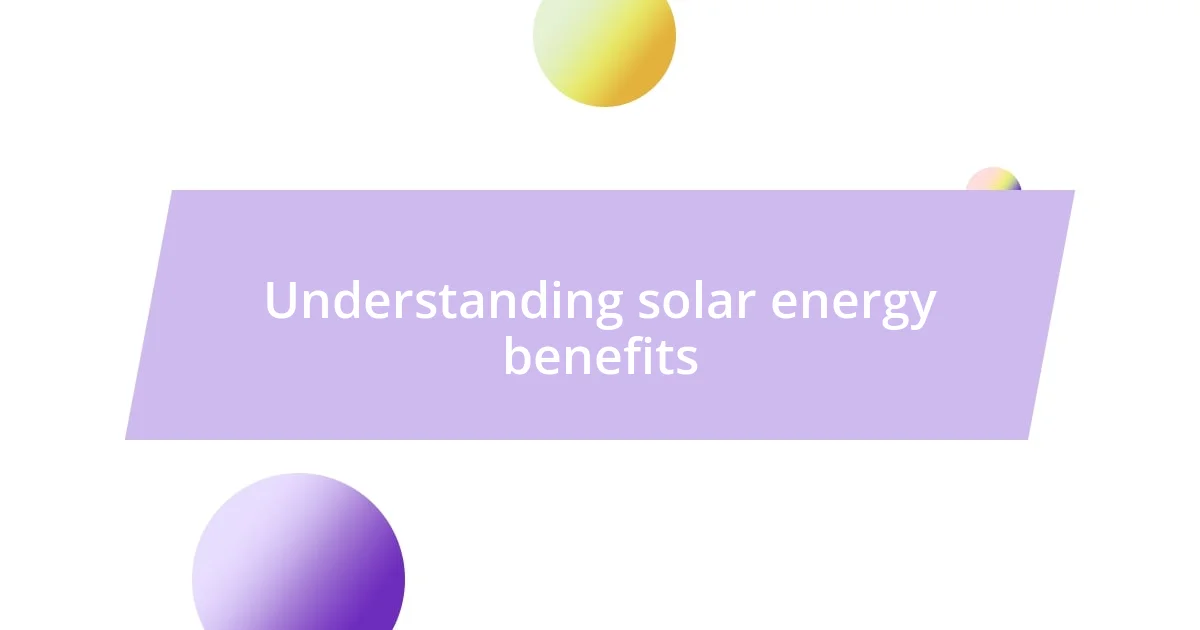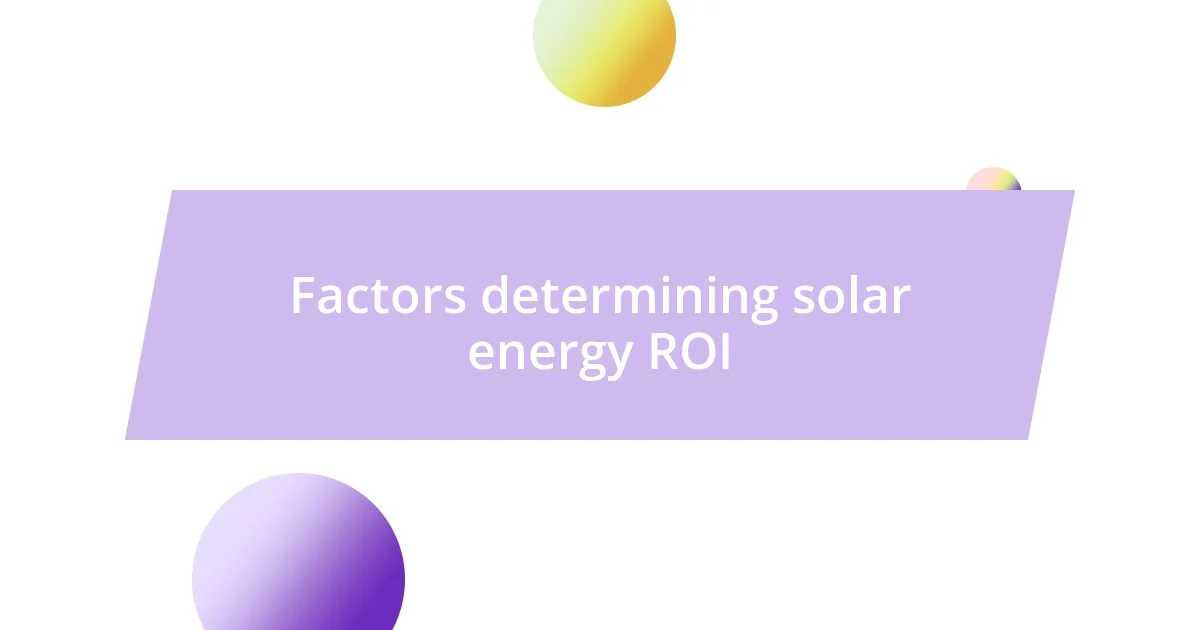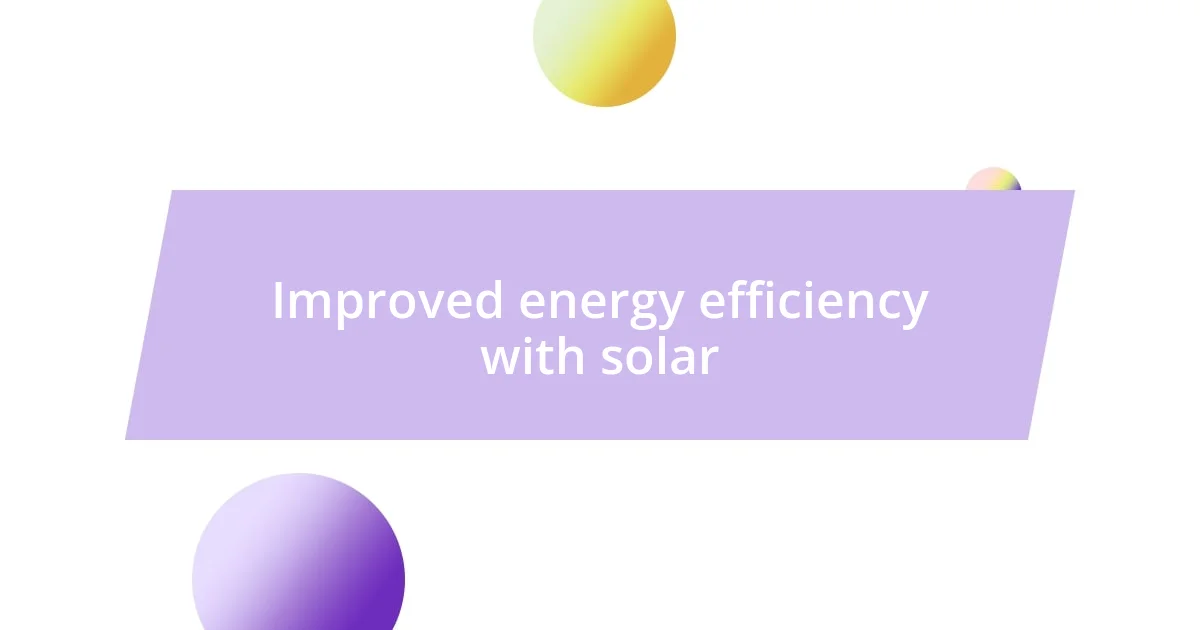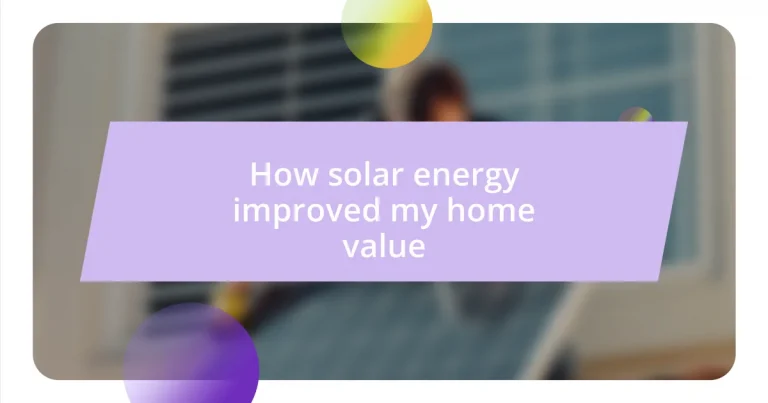Key takeaways:
- Installing solar panels leads to significant savings on energy bills and enhances property value, making homes more attractive to potential buyers.
- Factors influencing solar energy ROI include local energy rates, installation costs mitigated by incentives, and the home’s geographic location affecting sun exposure.
- Solar energy improves overall energy efficiency, promotes lifestyle changes towards sustainability, and empowers homeowners by reducing their carbon footprint.

Understanding solar energy benefits
Solar energy brings more than just eco-friendliness; it offers tangible financial benefits. I remember when I first noticed my energy bills dropping significantly after installing solar panels—every month felt like a small victory. Isn’t it satisfying to see direct savings in your budget, knowing you’re also contributing to a cleaner planet?
Moreover, the value added to your home can be impressive. I was surprised when our neighbors expressed interest in our solar setup, mentioning how they thought it enhanced our property. Can you imagine how a home that promotes sustainability can stand out in the housing market? It certainly made our home more attractive to potential buyers, and it feels rewarding to contribute positively to the community.
Emotional well-being is another underrated aspect of going solar. It gives a sense of pride to harness natural energy and reduce one’s carbon footprint. When I look at my panels soaking up sunlight, I feel a connection to something bigger. Don’t you think embracing renewable energy can instill a sense of purpose and responsibility in each of us?

Factors determining solar energy ROI
Understanding the factors that determine the return on investment (ROI) for solar energy is essential for homeowners considering this upgrade. From my own experience, the local energy rates can significantly influence savings over time. I distinctly remember the shock when I compared energy prices before and after installation—seeing real numbers made the investment feel justified.
Another aspect to consider is the initial installation cost. I recall feeling a mix of excitement and nervousness when faced with the upfront expenses. However, I soon realized that available incentives, like tax credits and rebates, played a crucial role in enhancing that ROI. These financial boosts can make a considerable difference, allowing many homeowners to mitigate those initial costs effectively.
Lastly, the location of the home also plays a pivotal role in determining ROI. For example, living in an area with abundant sunlight can maximize solar energy production. I’ve seen neighbors in sunnier spots reap greater financial benefits than those in shaded locations. It’s fascinating how a simple factor like geography can impact our overall energy savings and, consequently, the value of our homes.
| Factor | Description |
|---|---|
| Local Energy Rates | Higher rates lead to greater savings on energy bills, enhancing ROI. |
| Initial Installation Cost | Can be offset by incentives, impacting the net benefit over time. |
| Location | Sun exposure affects energy production, influencing overall savings. |

Improved energy efficiency with solar
Solar panels significantly boost energy efficiency in ways I never anticipated. After installing them, I witnessed not only a drop in energy bills but also a noticeable difference in how my home felt. The temperature regulation improved, making summers more comfortable and reducing the need for excessive air conditioning. Have you ever entered a space that feels perfectly climate-controlled? That’s the magic of harnessing solar energy to regulate your home.
When I engaged with other homeowners in the community, a recurring theme emerged: energy efficiency isn’t just about lower bills; it’s about a lifestyle change. One friend recounted how their family started using energy-efficient appliances after going solar. This transition not only lowered their consumption but also made them more conscious about their overall energy use. I couldn’t help but think, has going solar sparked a broader awareness about energy consumption in our community?
Moreover, with solar energy, I felt a new sense of empowerment regarding my home’s environmental impact. I remember the first time I calculated our carbon footprint reduction after installing the panels—it was exhilarating! I found myself sharing this information with friends, encouraging them to consider solar as a responsible choice. Isn’t it uplifting to think that by improving energy efficiency at home, we’re not just benefiting ourselves, but also making strides toward a more sustainable future?














